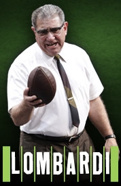What's Up, Keith Nobbs? The Lombardi Actor Talks Packers Fans and Drinking With Judith Light
Legendary Green Bay Packers coach Vince Lombardi may be the title character of the new football drama Lombardi, but it’s Keith Nobbs who helps reveal Lombardi’s persona to the audience. As fictional Look Magazine reporter Michael McCormack, Nobbs is sent to Green Bay to break down the guarded walls of the jovial but easily angered coach. “He gets that crazed Lombardi look in his eyes and it is terrifying,” Nobbs laughs about going head to head with co-star Dan Lauria. The bright eyed actor, who recently appeared in HBO’s epic World War II miniseries The Pacific, chatted with Broadway.com about life on the Lombardi team, the play’s unusual audience and discovering his inner soldier.
Your character is the only fictional person in the show. Was it hard to shape Michael when your co-stars had real people to research?
I was grateful for that because that meant I couldn’t play the part wrong [laughs]. I just did The Pacific and all the marines in the story were actual people. I got to meet the widow of the man I played, which is such a gift, but the responsibility of that is huge because you’re telling the story of people’s lives. After that, I was grateful for the opportunity just to make up a character.
The play is performed in the round. Have you seen anything odd in the audience?
A couple weeks ago there was a guy in the front with a Packers jersey on, which is pretty normal for this show, but he was sitting there with this huge, yellow Packers helmet with this expression like, "I hope you get this right." At the end you always see guys who look like they’re not used to crying, and their eyes are filled up. With this play we’re dealing with people’s personal history. A lot of people come from Wisconsin, and from the generation who grew up with Vince Lombardi, so the play evokes memories.
Are Lombardi’s fans ever angry to see a fictional character inserted into the story?
A lot of people end up asking where they can read the article Michael wrote. I feel like the article he would’ve written is really this play. It tells the story of Vince Lombardi the man, not Vince Lombardi the legend. Lombardi to some degree is incapable of change. The challenge [playwright Eric Simonson] had in front of him was how to you make a compelling story of someone like that, so by creating Michael, someone who is affected by Vince, the play becomes almost an homage to every mentor or teacher you’ve ever had who changed your life.
Have you thought about doing some kind of character exercise and actually writing an article?
I’ve definitely played with that idea and I may do that in the future. There’s an article [director Thomas Kail] gave me from the 50s about Frank Sinatra that’s in the tone of what Michael would’ve written. It’s an amazing 30-page article about this guy following Sinatra around, from the smell of cigarettes on his fingers to the little smiles they share. You feel like you’re in the room with Sinatra.
Speaking of cigarettes and alcohol, Judith Light [as Marie Lombardi] keeps pouring drinks throughout the show! We have to ask—what’s in them?
I wish we were method actors and drank straight vodka! [Laughs.] It’s all water and iced tea. When people see the play, they always want to go out and get a Manhattan or an Old Fashioned afterwards. The cast really enjoys being around each other, so we go out a fair amount too.
You mentioned The Pacific. Tell us about filming such an sprawling project.
It was unbelievable. We shot in Australia and did a 10-day boot camp in the rainforest. You’re terrified because you’re thinking, "We’re a bunch of actors. What are we doing?" We’d wake up at 5:00 AM to do our exercises, but they didn’t tell us there was another boot camp [for the actors playing Japanese soldiers] through the jungle. So you’d hear Japanese shouting, and we’re all looking at each other like "We’re going to die." You’d think in that situation you’d be able to maintain a discernment of what is real and what isn’t, but that broke down so quickly. It became about this life-or-death situation these men were in. I’ve never been pushed to physical limits like that. It’s funny because now I’m in a football show, and there, I was running around as a marine. I’m wondering how I ended up doing all these hyper-masculine roles!

